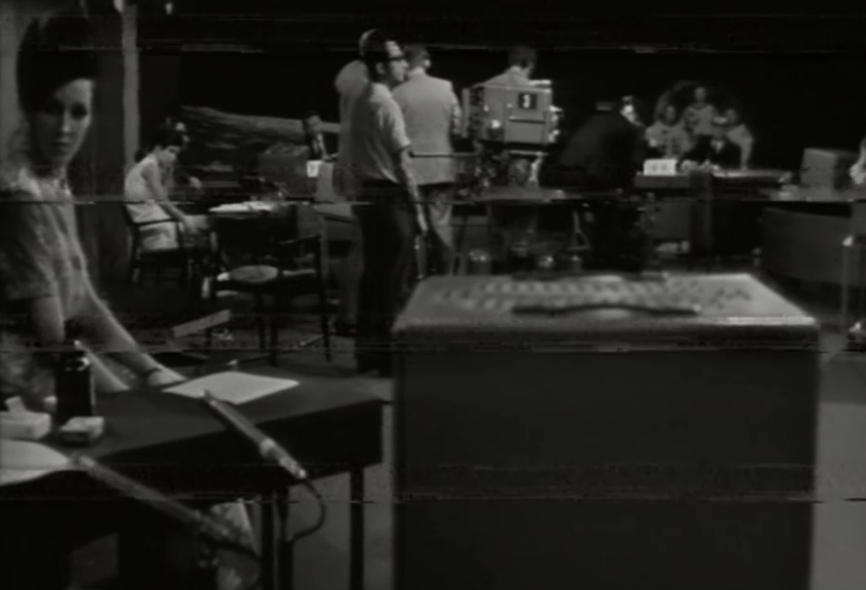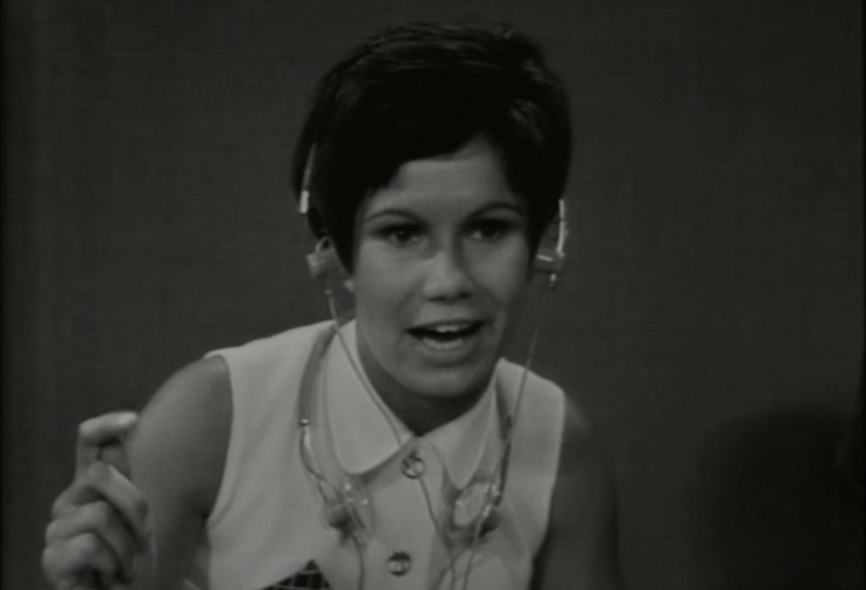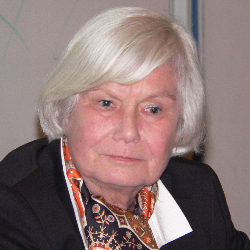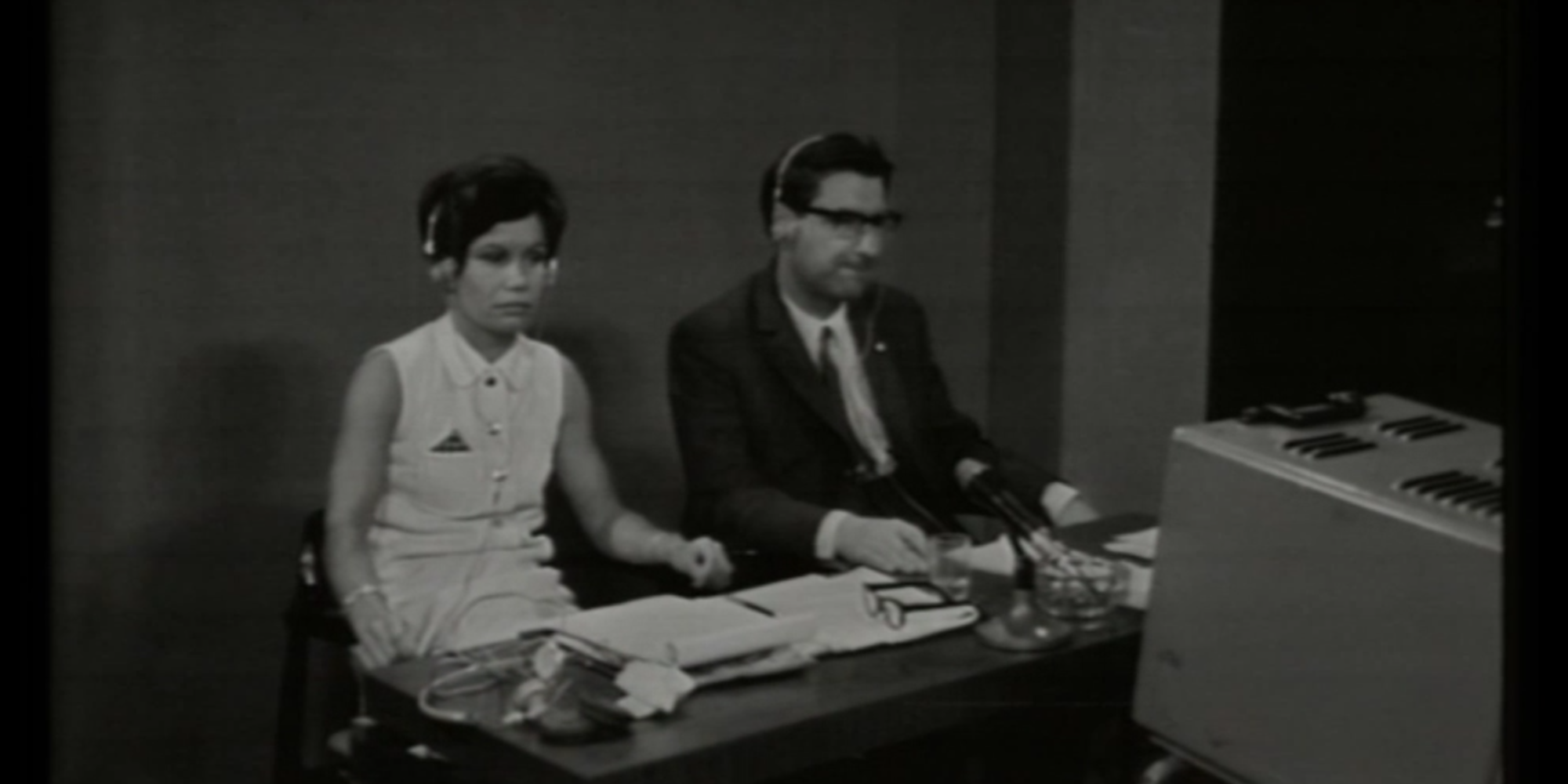On July 21, 1969, it was hot, crowded, and stuffy in the ORF broadcasting studio in Schönbrunn. They had been broadcasting live for over 24 hours into almost half the households in the country. From 500 to 600 million people wanted to be there when Neil Armstrong left the lunar module Eagle and became the first person to set foot on the moon. Later, the pictures went around the world. And before, on July 16, the first manned mission to the moon – Apollo 11 – had launched from the Kennedy Space Center. For the ORF, it had been a one-of-a-kind, 28-hour, technically and personally challenging broadcasting marathon. Two moderators, two commentators, and two interpreters were trying not to miss any of what was happening 384,400 kilometers away. Ingrid Kurz, who has been involved with Ars Electronica since the beginning, listened in with headphones to every word the astronauts said to each other and to mission control. We talked to her about the most spectacular assignment of her career and about her work at the Ars Electronica Festival.
Get more exciting perspectives on July 21, 1969 at the Ars Electronica Theme Weekend from July 11 to 14 at the Ars Electronica Center.
Can you please tell me what it was like in 1969 when you interpreted for the moon landing? How did the live broadcast go, and what was your personal experience of it?
Ingrid Kurz: It‘s widely known that it was a marathon broadcast, over 28 hours. It took place in the old Schönbrunn studio in Maxingstraße. It was insanely hot there, with floodlights, cameras, all packed into a very small space. Famously, Nidetzky, Pichler, Portisch and Urban provided the commentary. Nidetzky and Urban were the moderators, while Portisch and Pichler gave expert commentary. And I was there with a colleague, a former professor of mine, who also got me involved into TV work, Erich Simak, to interpret. It was our job to translate the conversations between the control center in Houston and the astronauts or, of course, the conversations between the astronauts themselves. The whole thing was of course terribly exciting, we were all trembling along with them. I can remember that during a short break we went outside for a bit and the moon was in the sky. You just couldn‘t imagine that in the next couple of hours someone was going to land there.
The landing took place shortly before 9 o’clock in the evening. That alone was terribly exciting and then nothing happened for a long time, because Armstrong only came out of the lunar module shortly after 3 o’clock in the morning. That was the instruction Houston gave him. In retrospect, it turned out that the reason they spent so long in the lunar module was that the Americans wanted to broadcast it during prime time. Relatively little happened during that time. Nidetzky in particular had brought a lot of material from America beforehand. So films were broadcast, and while that was going on we had to listen over the radio in case something came in. We could have interrupted at any time. We were given instructions, if something important happens — let us know right away. For the longest time there was nothing, sometimes the commentators ran out of things to say and they switched over to us. What’s going on with the interpreters? Often there was just static in our headphones. That was one of the difficulties. It was almost a miracle anyway that any kind of connection could take place at that distance – 384,000 kilometers. You couldn’t do anything about it. But when all you have in your headphones is static, you can’t interpret anything. So we just adopted a strategy where we took notes while we were listening and then we could at least say, a little while ago Armstrong discussed such and such with Aldrin.

The difficulties back then were the sound quality, as well as the technology. There was no Internet back then. You couldn’t just Google to get information the way you can today. The information we received came from the American Embassy. They gave us hectographed pages with a few pieces of information. The third difficulty was the pilots’ lingo. For subsequent Apollo missions, they brought in a colonel from the Austrian Armed Forces who was familiar with the language used by pilots. The reports were often incomprehensible or didn’t mean anything to a layperson. For example, the altitude readings before the landing. The last minutes were all about how many feet they were from the surface, in front of us is the crater, rate of descent is such and such, … They were just technical data that maybe weren’t that exciting, but during that time there was a bit of a breakdown. Armstrong reported that he was getting an emergency alarm. And as far as I remember, Houston wasn’t able to resolve it. Then Armstrong took over the whole thing manually and it turned out to be just a false alarm. It didn’t mean the astronauts were in danger, but of course it was a scary few seconds.
So there were the conversations between Houston and the astronauts. And then of course the astronauts talked to each other too. And also made some jokes. How exactly they spent their hours of waiting, I unfortunately can’t remember anymore. I couldn’t say whether during that long period, they just sat inside and waited. Whether there was a lot of talking there and we translated a lot, or whether most of the broadcasting time was spent showing films, movies Nidetzky had filmed in America.
I’ve read that whenever the moderators ran out of content, they brought in Portisch to give some quick commentary on what was happening around the world.
Ingrid Kurz: Yes of course, or they asked Dr. Pichler – he was described as the “Ear, NASA, and throat doctor” or they switched over to the interpreters and asked them what was going on up there. It was incredibly thrilling and exciting. It might sound silly, because after all, the people at home were getting all the same information we were getting in the studio, but you had the feeling that you were close to the action, the first to find out.
You must have discussed later the fact that Armstrong didn’t come out for a long time because he had to wait for American TV prime time. It was one of the first big events staged for media. What did you think of that? Did it annoy you while you were working?
Ingrid Kurz: While we were actually in the studio I didn’t even know that they were waiting for the American prime broadcasting hours. I assumed there were practical reasons for it. Afterwards that came out, okay, you can’t blame them for timing an event of that kind in that way, so that it comes through at the best possible time for the audience in their country.
But it was the first man on the moon, not just the first American. Was the USA justified in laying claim to it that way?
Ingrid Kurz: Well, you also have to see it in the context of the situation back then. Russia and America were in competition. The Cold War. The fact that Gagarin was the first person to go into space was of course a shock for the Americans. And then in 1961 Kennedy said, we’re going to send a man to the moon within this decade. And of course that was the competition between America and Russia. Yes, of course, they claimed it for themselves, as a really great achievement, which it was. And Nixon, who was president at that time, spoke with the astronauts right away and invited them to the White House. Then there was that huge tickertape parade after the landing in New York, where they were hailed as heroes. That’s understandable.

At the same time, the event also inspired a lot of euphoria about the future. People thought everything had become possible…
Ingrid Kurz: They did embark on further Apollo missions. Apollo 13, there were already technical difficulties. That was pretty exciting. And they kept going until Apollo 17. All the missions after Apollo 11 were of course still thrilling and exciting. But Apollo 11 was the highlight. Although later missions lasted longer, and spent longer on the moon. But at some point all the euphoria fizzled out…
Do you think we have a more pessimistic view of the future now?
Ingrid Kurz: I don’t necessarily see a connection between visions of the future and space. I think one result in particular was important. The view of Earth from the moon and the awareness that grew out of that. The fact that this blue planet is truly unique but also very fragile made a big impression on the astronauts. That was something you heard from them again and again in interviews. (…) Then there was a lot less reporting about space travel, the program was put on ice or continued on the back burner. But now there seems to be a new wave of enthusiasm. What will come of it is of course difficult to say, for me as a layperson.
This year we’re celebrating the 40th anniversary of Ars Electronica. How long have you been connected to our institution, to the Festival?
Ingrid Kurz: That’s a good question. For ages. I did it at the beginning with my professor, Erich Simak, with whom I also interpreted for the Apollo missions. He died young, I don’t know exactly when. And I was there pretty much from the beginning. When Hannes Leopoldseder started it. I can remember one of the first events, electronic music was something very, very unusual and Nam June Paik, back then.. But that wasn’t my first assignment for Ars Electronica. I wouldn’t be able to say now what my first year there was.
Do you prepare yourself for the content?
Ingrid Kurz: Yes, yes. Generally you have to prepare for every conference. For the moon landing, it was obviously somewhat difficult because everything was new and strange. And with Ars Electronica, we always get the catalogs, that’s already a big help, and of course you read the announcements beforehand, everything that’s in the newspaper, which people are coming. Today we have all kinds of access to information. Obviously, you have to prepare, because there’s always something new, even though some things repeat. There are always things at the Ars Electronica Festival that are completely new. Nam June Paik, for example or that Charlotte Moorman back in the day. Those were performances you couldn’t see anywhere else. That makes it exciting, I must admit.
Can you think of an assignment for Ars Electronica that was particularly special? Was there ever a disaster in the many years you’ve worked there?
Ingrid Kurz: There’s never been a major catastrophe. There have been a ton of positive things. I’m trying to think. What always impressed me – I studied psychology too, after all – is everything having to do with the brain, consciousness… Those presentations are especially exciting for me. Electronic music, I must admit, has the least appeal for me. The natural science things that are combined with art, I think those are so fascinating. Of course we also thought the computer animations were great: Lasseter with his little lamp…That was really groundbreaking! When you look at it today, it seems simple, but back then, at the beginning, it was really something great.
Speaking of our anniversary, what has changed over time?
Ingrid Kurz: It’s never stopped changing. It is still on the cutting edge, discovering new things. I’m also impressed by the contributions from schoolchildren. That’s a very impressive category! The Festival is a mainstay for me every year, and I’m already looking forward to being there again.
The Ars Electronica Theme Weekend from July 11 to 14 at the Ars Electronica Center will celebrate the 50th anniversary of the moon landing in numerous exciting lectures over four days.

Ingrid Kurz is a conference and TV interpreter and has been with Ars Electronica since its beginnings almost 40 years ago. After studying translation/interpreting and psychology, she made her first appearance on ORF in the US presidential election of 1968, in which the Republican Richard Nixon emerged victorious. In 1969, she interpreted NASA’s moon landing together with her former professor Erich Simak, who introduced her to television and Ars Electronica. She works as a professor at the Center for Translation Studies at the University of Vienna. From September 5 to 9, she will again be interpreting the conferences of the Ars Electronica Festival.
